Bloating after meals affects millions of people, leaving them searching for effective solutions. Two popular options stand out: digestive enzymes and probiotics. Both supplements promise relief, but they work in different ways to address digestive discomfort.
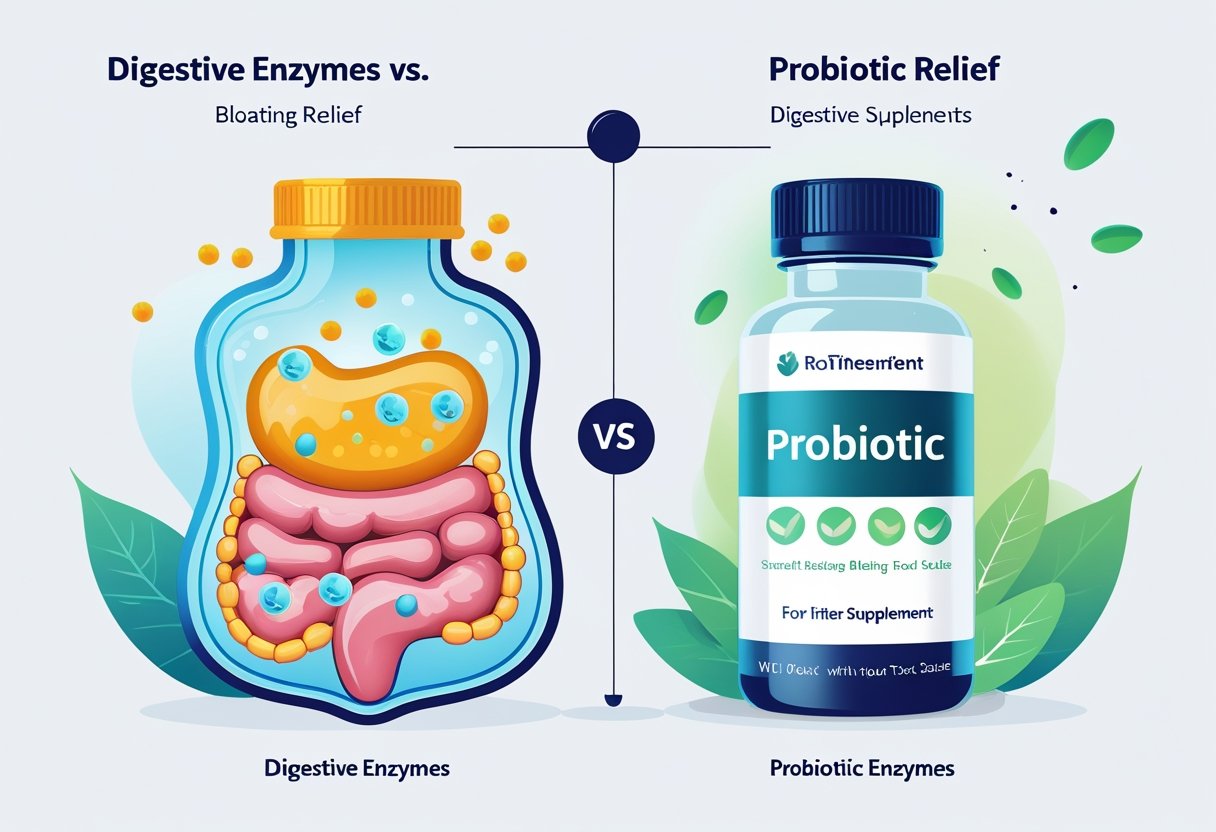
For bloating caused by difficulty breaking down specific foods, digestive enzymes provide faster relief, while probiotics work better for bloating related to gut bacteria imbalances. Digestive enzymes break down complex nutrients, while probiotics maintain balance between good and bad gut bacteria[1]. Understanding which type of bloating someone experiences helps determine the right approach.
The choice between these supplements depends on the root cause of bloating. Enzyme supplements can help compensate and support more efficient digestion, especially for those with bloating, gas, or food intolerances[2]. Meanwhile, if you struggle with bloating or bacterial imbalances, probiotics might be a better fit[3].
Key Takeaways
- Digestive enzymes work faster for bloating caused by food breakdown issues, while probiotics help with bacteria-related bloating
- Enzymes break down food components immediately, but probiotics take time to balance gut bacteria
- The best choice depends on whether bloating comes from digestion problems or gut bacteria imbalances
How Digestive Enzymes and Probiotics Work
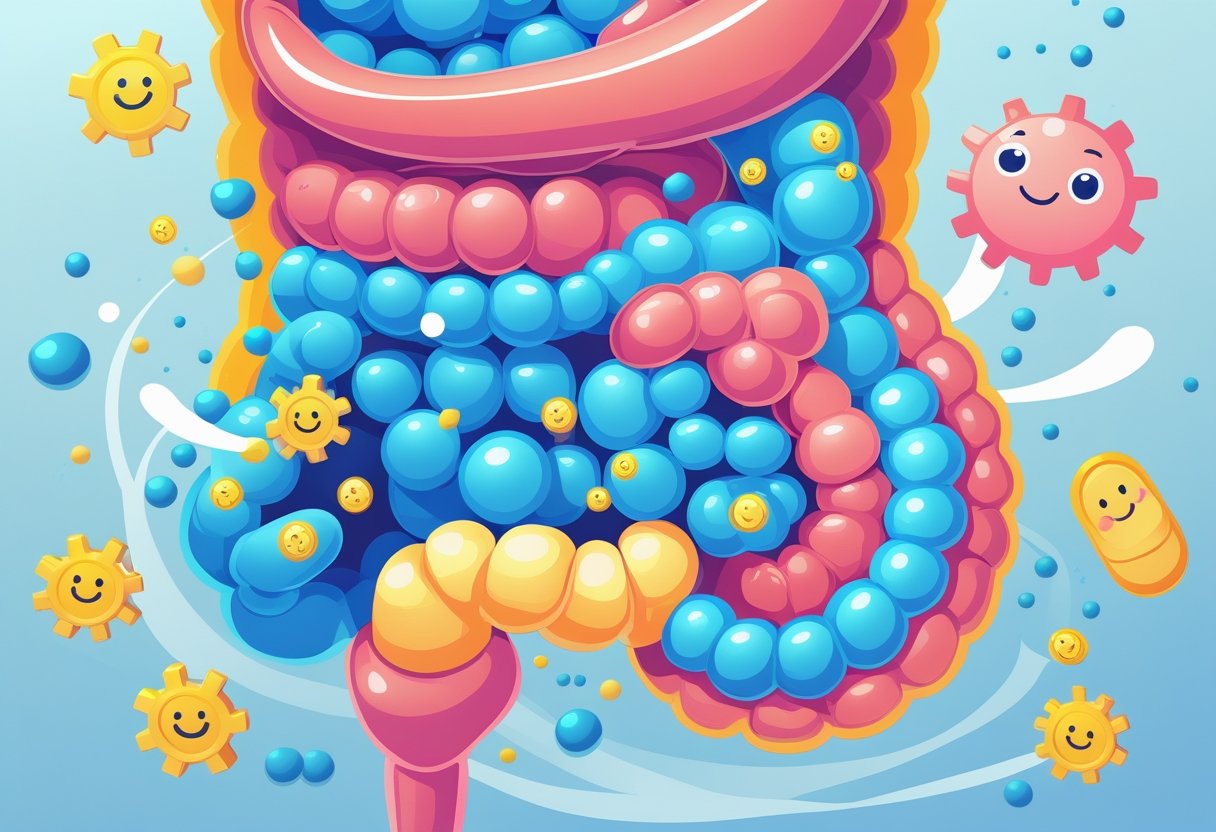
Both digestive enzymes and probiotics support gut health through distinct mechanisms. Digestive enzymes break down complex nutrients[1], while probiotics maintain the balance of gut bacteria in the microbiome.
Role of Digestive Enzymes in Digestion
Digestive enzymes are proteins that break down food and aid digestion[4]. The body produces these enzymes naturally to convert complex nutrients into smaller molecules that can be absorbed.
The digestive process begins in the mouth with saliva. The stomach, small intestine, and pancreas all produce different enzymes. The pancreas serves as the main enzyme powerhouse of digestion.
Key digestive enzymes include:
- Amylase – breaks down complex carbohydrates
- Lipase – breaks down fats
- Protease – breaks down proteins
- Lactase – breaks down lactose in dairy products
- Sucrase – breaks down sucrose
Enzymes handle the mechanical part of digestion in the upper digestive tract[5]. Without enough enzymes, people may experience bloating, gas, and difficulty absorbing nutrients from food.
Functions of Probiotics in the Gut
Probiotics are live organisms that make up the good bacteria in the gut[4]. These beneficial bacteria help maintain a healthy balance in the gut microbiota.
Unlike digestive enzymes, probiotics do not break down food directly. Instead, they support digestive health by maintaining the right environment for proper digestion to occur.
Probiotics work by:
- Keeping harmful bacteria in check
- Supporting immune function in the gut
- Producing helpful substances like vitamins
- Maintaining the intestinal barrier
Probiotics maintain microbial harmony in the lower digestive tract[5]. When the gut microbiome is balanced, it creates better conditions for nutrient absorption and overall digestive health.
Key Differences Between Digestive Enzymes and Probiotics
The two actually complement each other in different ways[6]. Digestive enzymes focus on breaking down food, while probiotics focus on maintaining bacterial balance.
| Digestive Enzymes | Probiotics |
|---|---|
| Break down food molecules | Balance gut bacteria |
| Work in upper digestive tract | Work in lower digestive tract |
| Made by the body naturally | Live microorganisms |
| Target specific nutrients | Support overall gut environment |
Enzymes break food into absorbable nutrients, while probiotics create a better environment for absorption[7]. This means they work at different stages of the digestive process.
The timing of their action differs significantly. Digestive enzymes work immediately when food enters the digestive system. Probiotics work continuously to maintain the gut microbiome over time.
Bloating: Causes and Symptoms
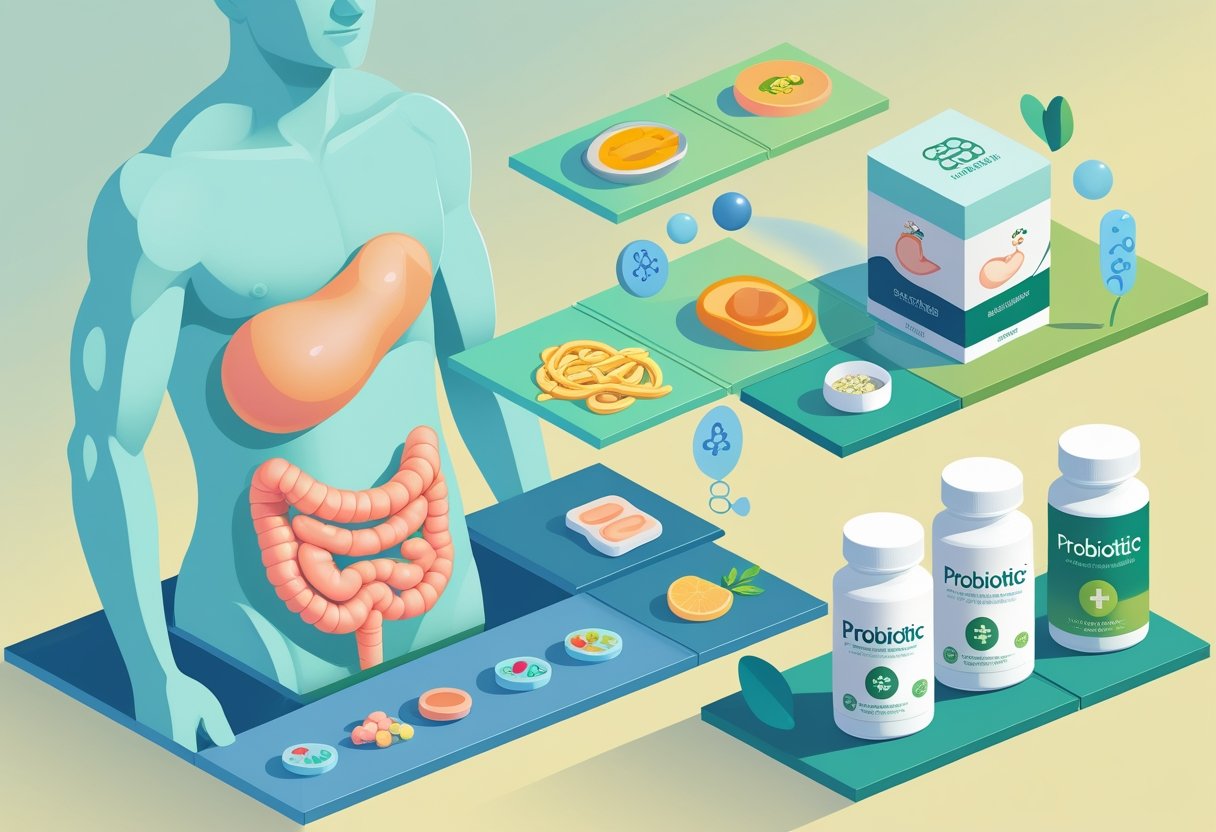
Bloating occurs when gas accumulates in the digestive tract, creating pressure and distension in the abdomen. Multiple factors contribute to this uncomfortable condition, from poor digestion to dietary choices and underlying gut imbalances.
How Bloating Develops in the Gut
Gas buildup in the digestive system creates the uncomfortable sensation of bloating. When food moves through the intestines, bacteria naturally break down undigested particles and produce gas as a byproduct.
Incomplete food breakdown often triggers excessive gas production. The stomach and pancreas release digestive enzymes to break down proteins, fats, and carbohydrates. When these enzymes are insufficient, undigested food reaches the colon where bacteria ferment it.
This fermentation process releases hydrogen, methane, and carbon dioxide gases. The intestinal walls stretch as gas accumulates, causing the abdomen to feel tight and distended.
Swallowed air also contributes to bloating. People swallow air when eating too quickly, chewing gum, or drinking carbonated beverages. Most swallowed air exits through burping, but some travels to the intestines.
Slow gut motility can worsen gas accumulation. When the digestive tract moves food slowly, more time allows for bacterial fermentation and gas production.
Symptoms Associated With Digestive Discomfort
Abdominal distension is the most recognizable sign of bloating. The belly visibly swells and feels tight or full, even after small meals.
Gas often accompanies bloating as trapped air seeks release through burping or flatulence. Some people experience sharp or cramping pains as gas moves through the intestines.
Irregular bowel movements[8] frequently occur alongside bloating. Constipation can worsen gas buildup, while diarrhea may follow periods of digestive distress.
Indigestion creates additional discomfort through stomach pain, heartburn, or nausea. The digestive system struggles to process food efficiently when bloating occurs.
Physical symptoms extend beyond the gut:
- Fatigue from digestive stress
- Back pain from abdominal pressure
- Difficulty breathing deeply
- Clothes feeling tighter around the waist
Some people notice gurgling or rumbling sounds as gas and food move through the intestines. These sounds indicate active digestion but can feel embarrassing in quiet settings.
Factors That Influence Bloating
Diet plays the primary role in bloating frequency and severity. High-fiber foods like beans, broccoli, and whole grains can cause gas in sensitive individuals. The gut bacteria ferment these complex carbohydrates, producing gas.
Foods that commonly trigger bloating:
- Dairy products (in lactose-intolerant people)
- Artificial sweeteners like sorbitol
- Carbonated drinks
- Fried or fatty foods
- Cruciferous vegetables
Eating habits significantly impact gas production. Eating too quickly prevents proper chewing and increases air swallowing. Large meals overwhelm the digestive system’s enzyme production capacity.
Stress affects gut function through the brain-gut connection. High stress levels can slow digestion and alter gut bacteria balance, leading to increased bloating episodes.
Medical conditions that influence bloating include:
- Small intestinal bacterial overgrowth (SIBO)
- Irritable bowel syndrome (IBS)
- Food intolerances
- Gastroparesis
Age reduces natural enzyme production, making older adults more prone to bloating. Certain medications like antibiotics can disrupt gut bacteria balance and increase gas production.
Digestive Enzymes for Bloating Relief
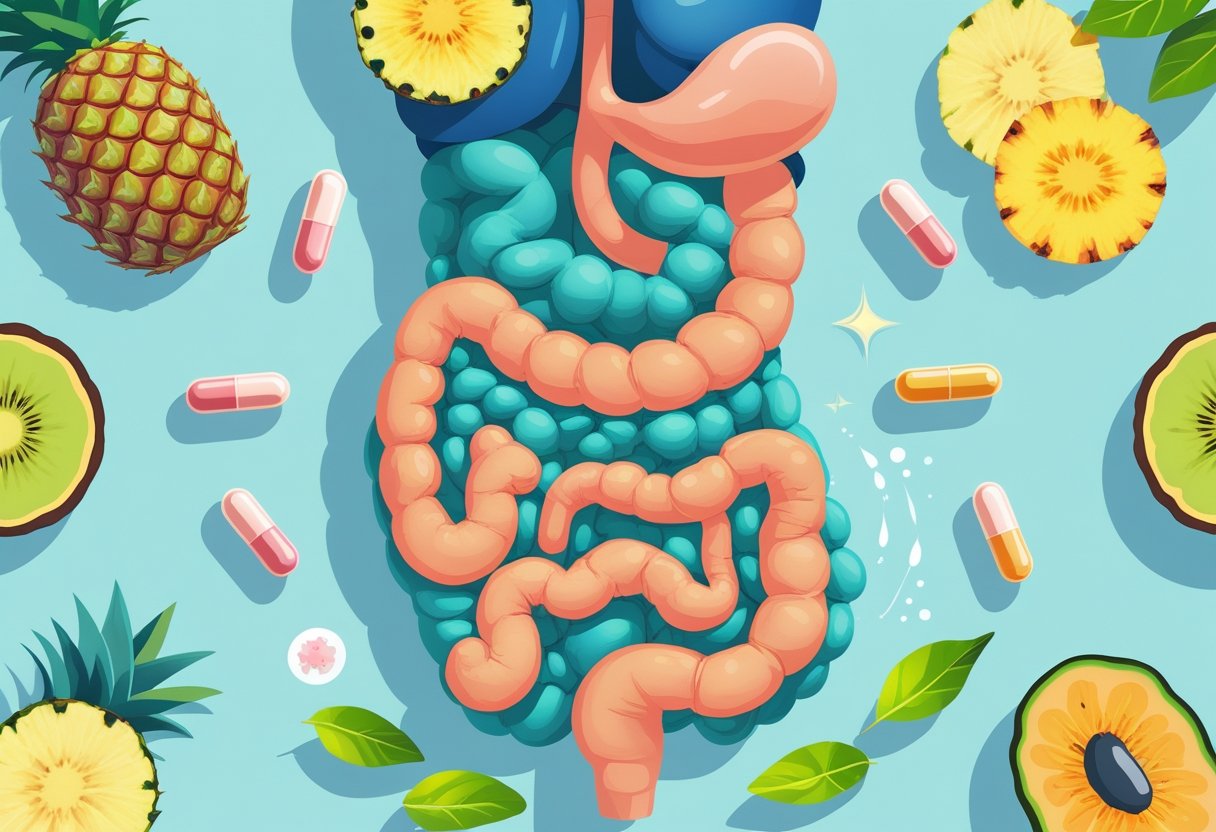
Digestive enzymes break down food into smaller molecules that the body can absorb, potentially reducing bloating caused by poor digestion. The pancreas produces most digestive enzymes, though the mouth, stomach, and small intestine also contribute to this process.
Types of Digestive Enzymes and Their Functions
The body produces several key digestive enzymes, each targeting specific food components. Amylase breaks down carbohydrates and starches into simple sugars. Protease enzymes break down proteins into amino acids. Lipase breaks down fats into fatty acids and glycerol.
Lactase specifically breaks down lactose, the sugar found in dairy products. People with lactose intolerance don’t produce enough lactase in their small intestine. This leads to bloating, gas, and digestive discomfort when they consume dairy.
Other specialized enzymes include alpha-galactosidase, which helps digest complex sugars found in beans and vegetables. This enzyme can reduce gas and bloating[9] for people who have difficulty digesting these foods.
Each enzyme works at different stages of digestion. The pancreas releases most enzymes into the small intestine when food arrives from the stomach.
Who May Benefit From Digestive Enzyme Supplementation
People with certain medical conditions may benefit from enzyme supplements. Those with exocrine pancreatic insufficiency (EPI) don’t produce enough pancreatic enzymes naturally. This condition affects people with chronic pancreatitis, cystic fibrosis, or severe Crohn’s disease.
Doctors prescribe medical-grade enzyme supplements for these conditions. These prescription enzymes help substitute for the lack of natural enzyme production[9].
People with lactose intolerance may benefit from lactase supplements. These help them digest dairy products without experiencing bloating or gas.
Some people experience bloating after meals but don’t have a diagnosed enzyme deficiency. However, there’s little evidence that over-the-counter enzyme supplements help most people[9] without specific conditions.
Food Sources of Digestive Enzymes
Natural foods contain enzymes that may support digestion. Papaya contains papain, a protease enzyme that helps break down proteins. Fresh pineapple contains bromelain, another protein-digesting enzyme.
Fermented foods provide some digestive support. Kimchi, sauerkraut, and miso contain enzymes produced during fermentation. These foods may help with overall digestive health.
Raw foods typically contain more active enzymes than cooked foods. Heat can destroy many natural enzymes during cooking. However, the body’s own enzyme production usually handles most digestive needs.
Ginger and other digestive herbs may stimulate natural enzyme production. They don’t contain significant amounts of digestive enzymes themselves but may support the digestive process.
Most people get adequate enzyme support from their pancreas and other digestive organs. Food sources mainly provide supplementary support rather than replacing the body’s natural enzyme production.
Probiotics and Their Role in Reducing Bloating
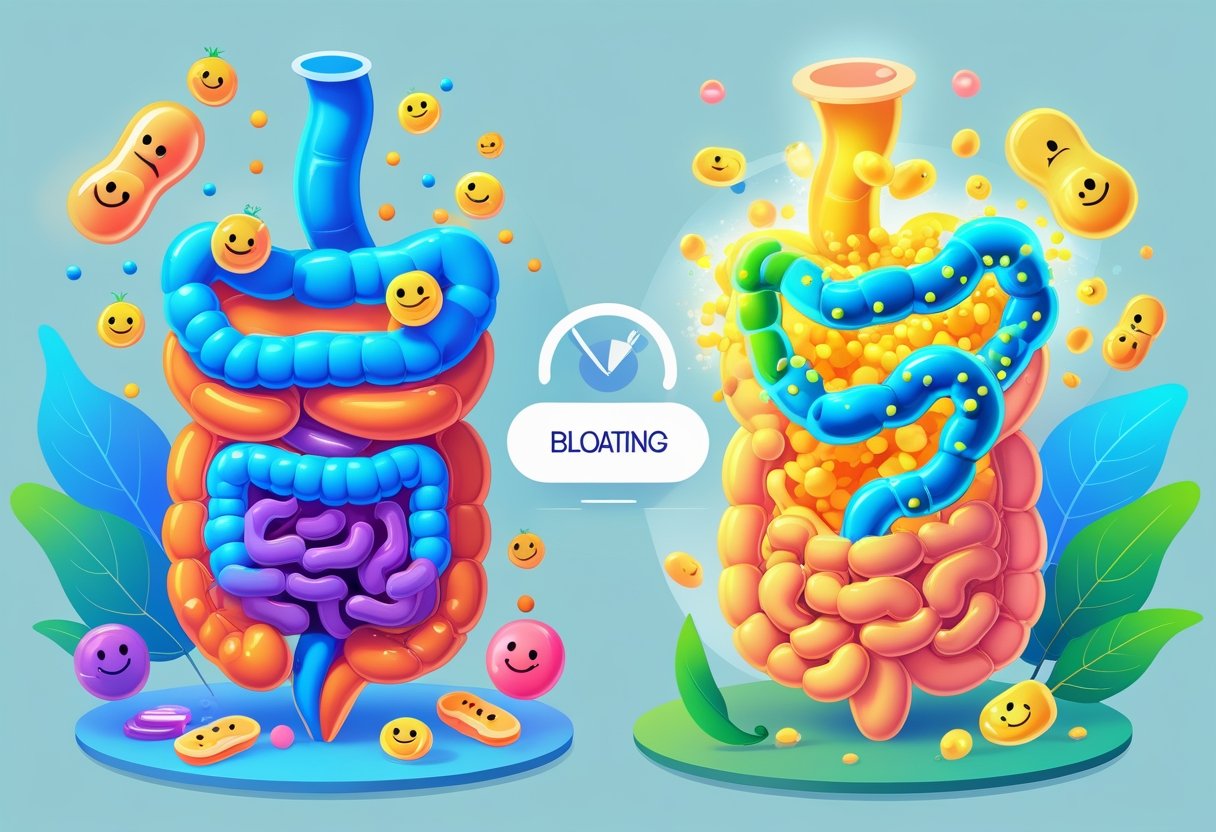
Probiotics work by introducing beneficial bacteria that help balance the gut microbiome and reduce harmful bacterial overgrowth. Specific strains like Lactobacillus and Bifidobacterium target different digestive issues, while fermented foods provide natural sources of these helpful microorganisms.
How Probiotics Balance the Gut Microbiome
Probiotics are live bacteria[3] that restore healthy gut balance by crowding out harmful microorganisms. They create an environment where good bacteria can thrive while bad bacteria struggle to multiply.
When the gut microbiome becomes unbalanced, bad bacteria can produce excess gas and cause inflammation. This leads to bloating and digestive discomfort.
Probiotics help by:
- Competing for space: Good bacteria take up room that bad bacteria would normally occupy
- Producing beneficial compounds: They create substances that support gut health
- Strengthening the gut barrier: This prevents toxins from entering the bloodstream
Probiotics can help reduce bloating[10] by introducing healthy bacteria into the digestive system. The process takes time as the microbiome gradually shifts toward a healthier balance.
People with conditions like IBS or SIBO often see the most benefit from probiotic therapy. These conditions involve bacterial imbalances that probiotics can help correct.
Common Probiotic Strains and Their Benefits
Different probiotic strains target specific digestive problems. Lactobacillus strains are particularly effective for lactose intolerance and general digestive health.
Bifidobacterium helps with overall gut balance and may reduce bloating in people with IBS. These bacteria naturally live in the large intestine where they ferment fiber and produce beneficial short-chain fatty acids.
Saccharomyces boulardii is a beneficial yeast rather than bacteria. It helps restore gut balance after antibiotic use and may reduce bloating caused by bacterial overgrowth.
| Strain | Primary Benefits | Best For |
|---|---|---|
| Lactobacillus acidophilus | Lactose digestion, immune support | Dairy sensitivity, general gut health |
| Bifidobacterium longum | Reduces inflammation, improves regularity | IBS symptoms, chronic bloating |
| Saccharomyces boulardii | Prevents bad bacteria growth | Post-antibiotic recovery, traveler’s diarrhea |
Research shows these specific strains can help reduce gas production and improve digestive comfort when taken consistently.
Fermented Foods as Natural Probiotic Sources
Fermented foods provide natural probiotics that may be more effective than supplements. Sauerkraut contains multiple Lactobacillus strains that support digestive health.
Kimchi offers probiotics along with prebiotics from vegetables that feed beneficial bacteria. The spicy Korean dish provides both immediate probiotic benefits and long-term gut support.
Kefir contains more diverse bacterial strains than yogurt, including beneficial yeasts. It provides probiotics that can survive stomach acid better than many supplements.
Probiotics from fermented foods[3] like yogurt, kefir, and kimchi may be safer and more effective than probiotic supplements. These foods contain multiple strains working together naturally.
Other beneficial fermented foods include:
- Miso: Contains probiotics and digestive enzymes
- Tempeh: Provides probiotics and complete proteins
- Kombucha: Offers probiotics and may improve gut barrier function
Regular consumption of these foods helps maintain a diverse microbiome that supports healthy digestion and reduces bloating over time.
Comparing Digestive Enzymes and Probiotics: Which Is Better for Bloating?
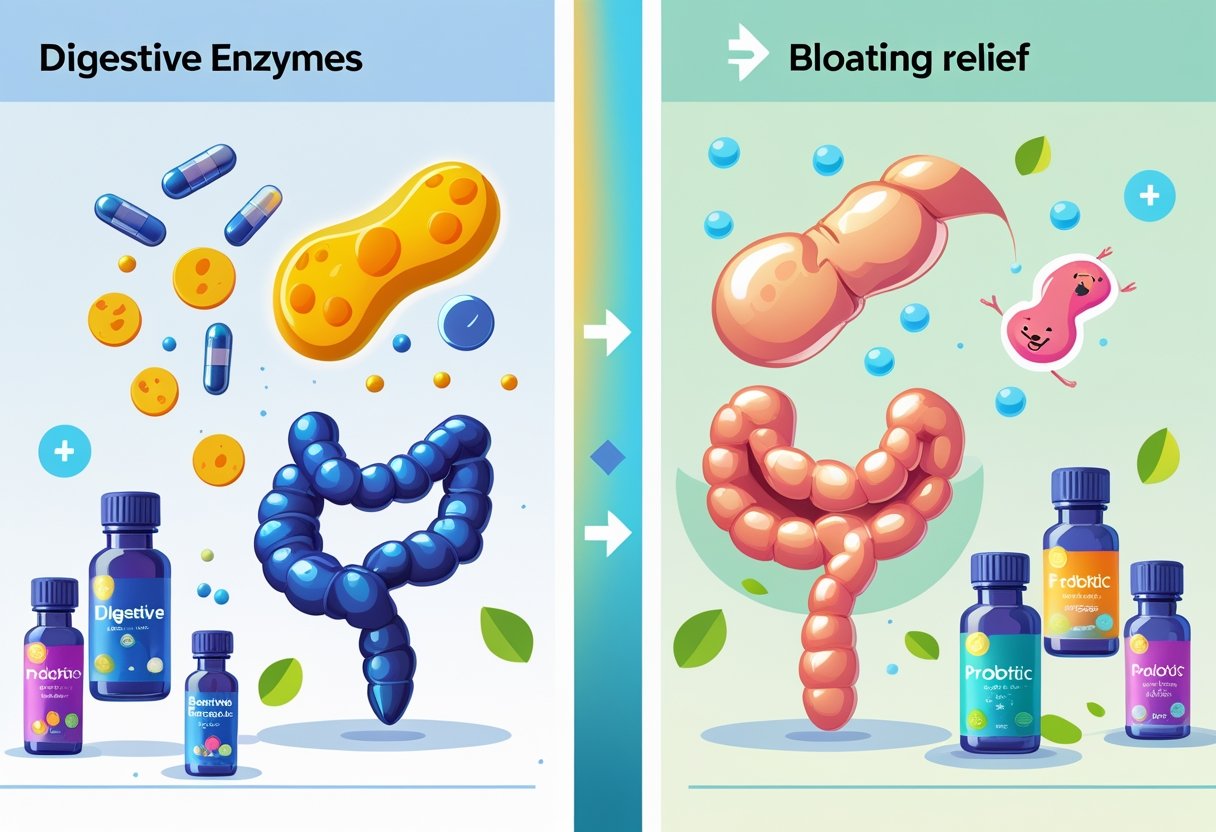
Digestive enzymes work best when bloating comes from poor food breakdown, while probiotics help when bacterial imbalances cause the problem. Both can be used together to address different root causes of digestive discomfort.
When to Choose Digestive Enzymes
Digestive enzymes are the better choice when bloating happens right after eating specific foods. Digestive enzymes break down complex nutrients into smaller particles[1] that the body can absorb more easily.
People should consider digestive enzymes when they experience:
- Immediate bloating after eating fatty, protein-rich, or dairy foods
- Undigested food particles in their stool
- Gas and discomfort within 30 minutes to 2 hours of eating
- Lactose intolerance symptoms like cramping and bloating
These enzymes work in the upper digestive tract. They help break down food before it reaches the large intestine where gas-producing bacteria live.
Lactase enzymes help people digest dairy products without bloating. Lipase enzymes break down fats that can cause discomfort. Protease enzymes help digest proteins that might otherwise ferment in the gut.
The timing matters with enzyme supplements. Taking them at the start of meals gives them time to mix with food during digestion.
When to Choose Probiotics
Probiotics work better for bloating caused by bacterial imbalances in the gut. Probiotics help maintain a balance between good bacteria[1] in the digestive system.
Key signs probiotics might help:
- Bloating that comes and goes without clear food triggers
- Recent antibiotic use that disrupted gut bacteria
- Chronic digestive issues like irregular bowel movements
- Signs of intestinal permeability problems
Specific probiotic strains target different bloating causes. Clostridium butyricum produces compounds that reduce intestinal permeability and gas. Lactobacillus acidophilus creates an environment that discourages harmful bacteria growth.
Bifidobacterium animalis has been shown in studies to improve digestive comfort and reduce abdominal distention. These beneficial bacteria work in the large intestine where most gas production happens.
People who struggle with bloating or bacterial imbalances[3] often see better results with targeted probiotic strains rather than general digestive enzymes.
Can You Use Both Together for Bloating?
Using digestive enzymes and probiotics together can address bloating from multiple angles. The two actually complement each other by improving digestion processes while maintaining a healthy digestive environment[11].
How they work together:
- Enzymes break down food in the upper digestive tract
- This reduces undigested food reaching the large intestine
- Less undigested food means less material for harmful bacteria to ferment
- Probiotics then maintain healthy bacterial balance in the lower gut
Better food breakdown may reduce the burden on the large intestine, creating a more balanced environment for probiotic bacteria[12]. This combination approach works well for people with complex digestive issues.
Best timing for combination use:
- Take digestive enzymes at the start of meals
- Take probiotics consistently, either with food or as directed
- Allow both supplements to work in their respective areas of the digestive system
People often see better bloating relief when addressing both poor food breakdown and bacterial imbalances rather than targeting just one cause.
Digestive Health Conditions Linked to Bloating
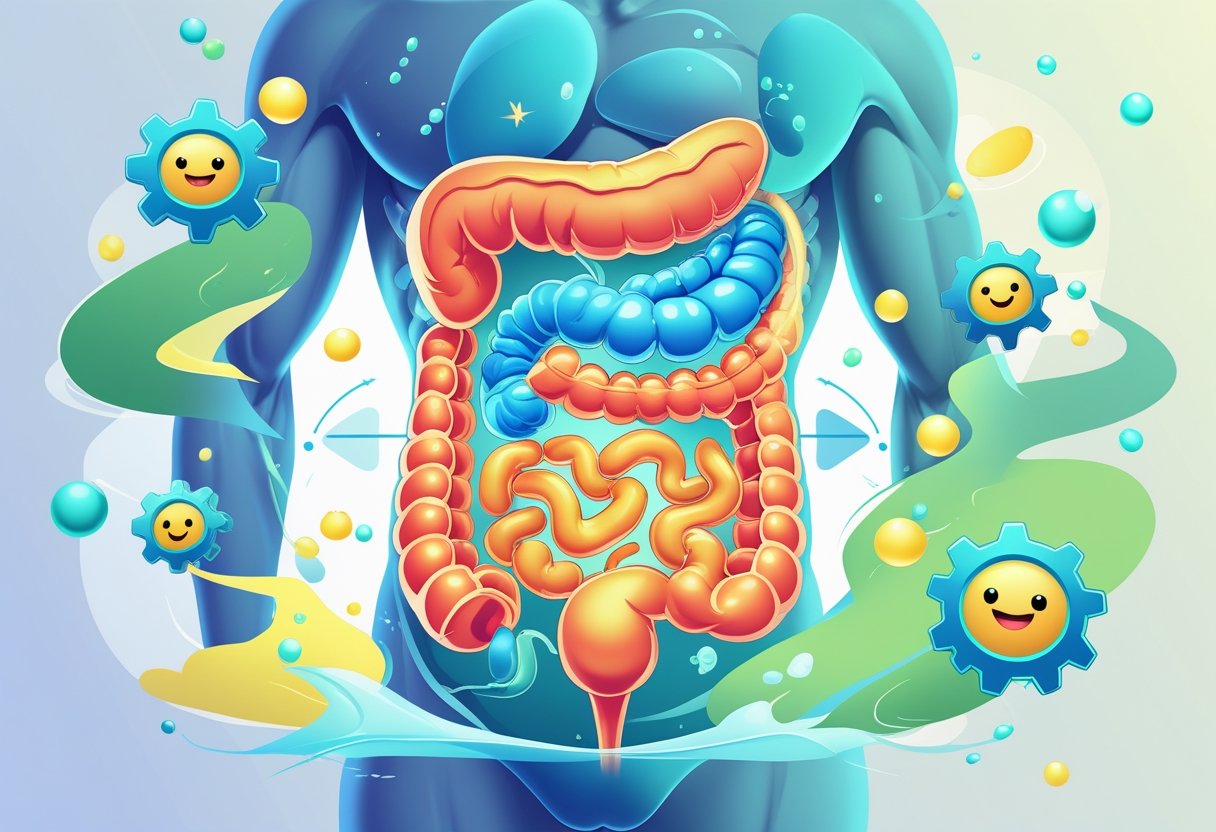
Several medical conditions can cause chronic bloating by affecting how the body breaks down food or maintains gut balance. Poor gut microbiome health and lifestyle choices also play major roles in digestive discomfort.
Medical Conditions Requiring Digestive Support
Exocrine pancreatic insufficiency (EPI) occurs when the pancreas cannot produce enough digestive enzymes. This condition affects people with chronic pancreatitis, cystic fibrosis, or severe diabetes.
People with EPI struggle to break down fats and proteins properly. This leads to bloating, gas, and nutrient deficiencies.
Crohn’s disease damages the small intestine where many digestive enzymes work. The inflammation can reduce enzyme production and affect food breakdown.
Lactose intolerance happens when the body makes too little lactase enzyme. Without enough lactase, dairy products cause bloating and digestive upset.
Celiac disease damages intestinal villi that produce digestive enzymes. Even on a gluten-free diet, some people need enzyme support while their gut heals.
These conditions often require enzyme supplements for digestive support[13] along with medical treatment.
Gut Microbiome Imbalances and Health Outcomes
The gut microbiome contains trillions of bacteria that help with digestion and immunity. When harmful bacteria outnumber beneficial ones, bloating often results.
Small intestinal bacterial overgrowth (SIBO) causes bacteria to grow in the wrong part of the digestive system. These bacteria ferment food too early, creating excess gas and bloating.
Antibiotic use can wipe out beneficial bacteria while leaving harmful strains behind. This imbalance affects how well the gut processes food.
Stress and illness can change the gut microbiome quickly. Poor microbiome health links to conditions like bacterial vaginosis, urinary tract infections, and even acne.
People with gut microbiome imbalances may benefit from probiotics[3] to restore bacterial balance. The right probiotic strains can help reduce gas-producing bacteria.
Lifestyle Factors That Impact Bloating
Poor diet choices directly affect digestive health and bloating frequency. Highly processed foods lack the fiber that feeds beneficial gut bacteria.
Eating too much sugar feeds harmful bacteria that produce excess gas. Fast food and fried foods are harder to digest and often cause bloating.
Eating habits matter as much as food choices. Eating too quickly or while stressed reduces enzyme production. Large meals overwhelm the digestive system.
Food allergies and sensitivities cause inflammation that leads to bloating. Common triggers include gluten, dairy, and certain vegetables.
Sedentary lifestyle slows digestion and allows gas to build up in the intestines. Regular movement helps food move through the digestive tract.
Chronic stress reduces stomach acid and enzyme production while changing gut bacteria. Poor sleep also affects gastrointestinal health by disrupting the gut-brain connection.
Frequently Asked Questions
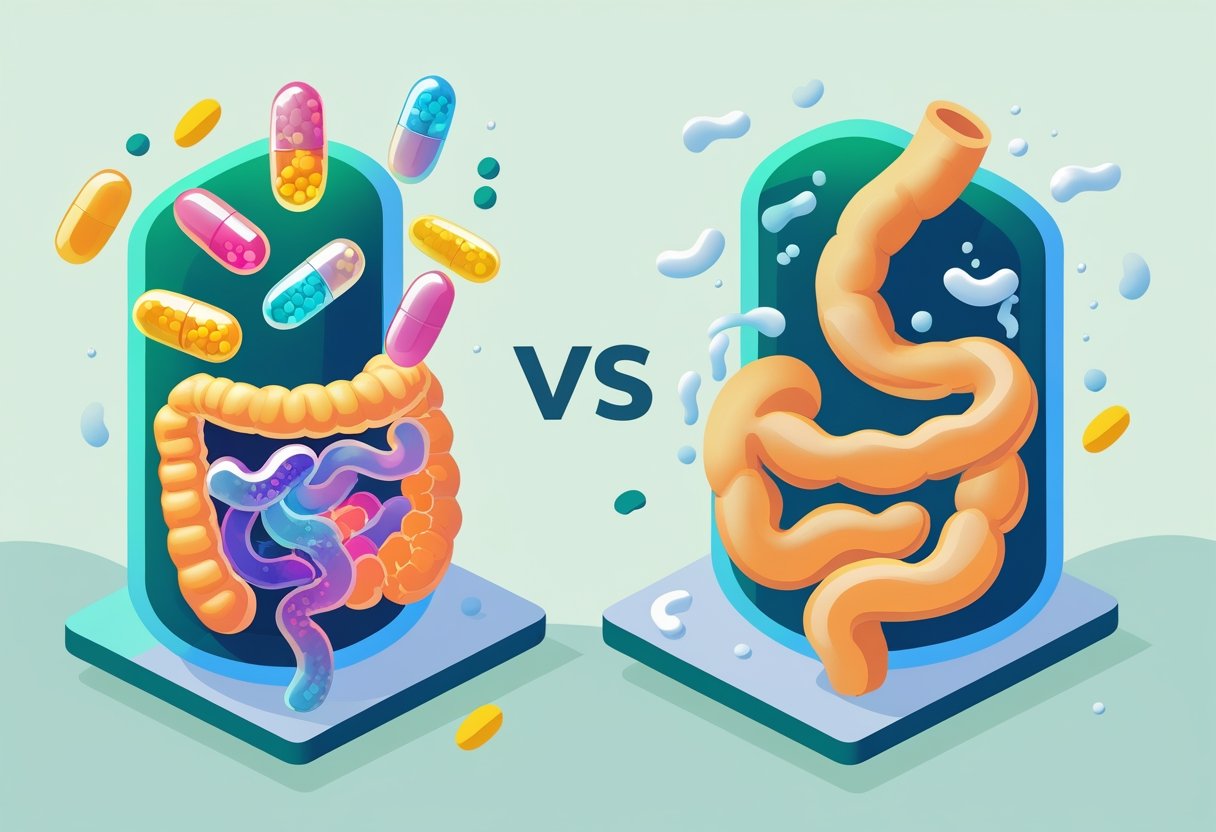
People often have specific questions about timing, combinations, and effectiveness when choosing between digestive supplements. These answers address the most common concerns about using probiotics and digestive enzymes for bloating relief.
What supplements are recommended to alleviate bloating more effectively, probiotics or digestive enzymes?
The choice between probiotics and digestive enzymes depends on the underlying cause of bloating. Digestive enzymes work faster to break down food[14] and provide immediate relief from gas and bloating caused by poor digestion.
Probiotics take longer to work but address bloating caused by bacterial imbalances in the gut. They help restore the natural balance of gut bacteria over time.
People with enzyme deficiencies or those over 50 often benefit more from digestive enzymes. Those with irregular bowel movements or recent antibiotic use typically see better results with probiotics.
Can probiotics and digestive enzymes be taken simultaneously without adverse effects?
Yes, probiotics and digestive enzymes can be taken together safely. They work in different ways and complement each other[15] to support digestive health.
Digestive enzymes break down food while probiotics maintain gut bacterial balance. Taking both addresses multiple causes of bloating at the same time.
Most people experience no negative interactions when combining these supplements. However, individuals should consult their doctor before starting any new supplement routine.
Which specific probiotic strains are known to provide the best relief for abdominal bloating?
Lactobacillus acidophilus helps break down lactose and reduces bloating in people with dairy sensitivity. Bifidobacterium lactis supports regular bowel movements and decreases gas production.
Lactobacillus plantarum produces enzymes that aid digestion and reduce inflammation in the gut. Bifidobacterium longum helps maintain intestinal barrier function.
Multi-strain probiotics often work better than single strains for bloating relief. The effectiveness depends on the specific strains and their amounts in each supplement.
How do digestive enzymes contribute to improved gut health and reduction of gas?
Digestive enzymes break down proteins, carbohydrates, and fats more completely. This prevents undigested food from fermenting in the intestines[16], which causes gas and bloating.
Amylase breaks down starches into simple sugars. Protease converts proteins into amino acids. Lipase transforms fats into fatty acids for easier absorption.
When food breaks down properly, less gas forms in the digestive tract. This leads to reduced bloating and a lighter feeling in the stomach after meals.
When is the optimal time to take probiotics and digestive enzymes to maximize their benefits for bloating?
Digestive enzymes should be taken with meals or right before eating. This timing allows them to work immediately on breaking down food as it enters the digestive system.
Probiotics work best when taken on an empty stomach or with a small amount of food. Taking them 30 minutes before meals helps more bacteria survive stomach acid.
Some probiotics can be taken at bedtime when stomach acid levels are lower. The timing depends on the specific product and its protective coating or delivery system.
Are there particular digestive enzymes that aid in weight management in addition to relieving bloating?
Lipase enzymes help break down dietary fats more efficiently. Better fat digestion can support healthy weight management by improving nutrient absorption and reducing stored fat.
Protease enzymes break down proteins completely, which supports muscle maintenance during weight loss. Proper protein digestion also increases feelings of fullness after meals.
Alpha-galactosidase helps digest complex carbohydrates from beans and vegetables. This reduces gas and bloating while allowing people to eat more fiber-rich foods that support weight management.
References
- Probiotics vs digestive enzymes: What's the difference?. https://www.livescience.com/probiotics-vs-digestive-enzymes Accessed November 13, 2025
- Digestive Enzymes vs. Probiotics: What’s the Difference & Which One Do You Need?. https://bodybio.co.uk/blogs/blog/digestive-enzymes-vs-probiotics?srsltid=AfmBOorHq3FmXMscF3fz3AANzBBT8P0IHchDV2oALDni9qdM6vCy8JZU Accessed November 13, 2025
- Page not found • WellWise Services Area Agency on Aging. https://wellwiseservices.org/digestive-enzymes-and-probiotics-know-which-one-is-best-for-you/ Accessed November 13, 2025
- Attention Required!. https://www.hopkinsmedicine.org/health/wellness-and-prevention/digestive-enzymes-and-digestive-enzyme-supplements Accessed November 13, 2025
- Digestive Enzymes vs. Probiotics: What’s the Difference & Which One Do You Need?. https://bodybio.co.uk/blogs/blog/digestive-enzymes-vs-probiotics?srsltid=AfmBOopuQguBNWmavx9c6hcL_OosGPklGgdebvaej5ggJhOLaXAIRRI5 Accessed November 13, 2025
- Digestive Enzymes vs Probiotics. https://omnibioticlife.com/blogs/blog/digestive-enzymes-vs-probiotics?srsltid=AfmBOoq735YljzN1arD5GZqPb71gI7XB4w-KBdNkrZEFGthneTIyIhPb Accessed November 13, 2025
- Synergies & Differences Between Digestive Enzymes and Probiotics. https://primehealthdenver.com/blog/digestive-enzymes-probiotics/ Accessed November 13, 2025
- Digestive Enzymes vs. Probiotics: What’s the Difference & Which One Do You Need?. https://bodybio.com/blogs/blog/digestive-enzymes-vs-probiotics?srsltid=AfmBOor-5uvmBCP7Wr6zPVodSpjF_Sj1SIE0iY8O5AMVR8gpiuZ1KOdf Accessed November 13, 2025
- Can taking enzyme supplements help soothe my bloating?. https://www.health.harvard.edu/staying-healthy/can-taking-enzyme-supplements-help-soothe-my-bloating Accessed November 13, 2025
- Probiotics and Bloating: Treatment, Side Effects, More. https://www.healthline.com/health/digestive-health/probiotics-bloating Accessed November 13, 2025
- Digestive Enzymes vs Probiotics. https://omnibioticlife.com/blogs/blog/digestive-enzymes-vs-probiotics Accessed November 13, 2025
- Digestive Enzymes vs. Probiotics: Which One Is the Best?. https://pendulumlife.com/blogs/news/digestive-enzymes-vs-probiotics Accessed November 13, 2025
- 7 Helpful Supplements for Bloating. https://www.healthline.com/nutrition/supplements-for-bloating Accessed November 13, 2025
- Just a moment.... https://seed.com/cultured/digestive-enzymes-vs-probiotics-gut-health-guide/ Accessed November 13, 2025
- Digestive Enzymes vs. Probiotics: Which You Should Take & Why. https://www.mindbodygreen.com/articles/digestive-enzymes-vs-probiotics Accessed November 13, 2025
- Digestive Enzymes vs Probiotics. https://essentialstacks.com/blogs/gut-health/digestive-enzymes-vs-probiotics Accessed November 13, 2025
